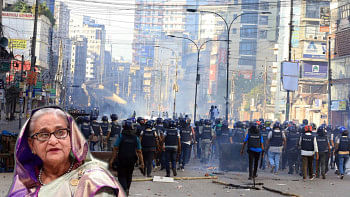Decision Pending

He was hell-bent on getting out of Purgatory. There was no good reason for him to be in this position but here he was. It really wasn't his fault though. A simple, small-time businessman, Nawab Ali had never cheated anyone; nor had he tried to take shortcuts to prosperity, though the opportunities had constantly presented themselves. He had been happy with the little he had managed to scrape together. It had been enough to acquire a tiny piece of land on the outskirts of Dhaka where he had built a small tin shed for his family of four. He had been afraid that his mother, on seeing the new place, would decide to move in with his family. Thankfully though, his older brother had pouted and protested. Neither Nawab Ali nor his wife got along well with her and the small quarters would certainly have created a chaos he was not ready to handle. In fact, her presence would have wreaked havoc on his marriage. The children were fond of their grandmother, but even they couldn't tolerate her for too long. She tended to interfere in everything, for she thought such interference as dispensing good, wholesome advice. But children these days, she would say, shaking her head in disappointment as she did so, didn't know a good thing when they had it.
Thinking of his mother brought back memories of his early days. His father had been quite well-off, but miserly. Anyone who saw the family would think they were always in dire need: the children, though named handsomely, wore ragged clothes and looked malnourished; the mother's hair had turned grey before her time; the house was dilapidated. And yet, the grave in which Nawab Ali's father finally lay was elaborate to a fault. He had almost literally taken his money to his grave with him. No one knew how much the old man had accumulated and no one benefitted from his death. The family had struggled to make ends meet until Nawab Ali decided to come to Dhaka to try his luck. He had been in his early twenties then and full of hope. Hard work had not deterred him and soon, he began to do well. His older brother was jealous at not having the same success even though he had started earlier, but Nawab Ali did not really care. Though he was willing to lend a hand when necessary, Nawab Ali refused to indulge his brother's frequent self-pitying laments. Once, just once, he had allowed himself to listen, and that had been enough – he had never made that mistake again.
Such thoughts distracted him for a while from his present predicament but were not enough to overcome his feelings of anxiety, worry, fear – fear, above all. Nawab Ali was not normally afraid of much. Once, as a child, he had nearly drowned when his older brother had held him under water for just a little longer than he should have. He had let go when their mother screamed on realizing what was happening. Later, his brother had said he was trying to teach his brother to swim underwater. Everyone believed him then, except Nawab Ali, who had seen the wild look in his brother's eyes just before he had pushed him in. This experience had taken all fear out of Nawab Ali. Afterwards, no matter what his brother did, he could not cow the boy anymore. Nawab Ali, the man, was not to be intimidated either. But, in this situation, where he saw no chance of rescue or escape, he was scared.
Nawab Ali tried to look around but his head seemed to be immobilized by some heavy objects. It was pitch dark and his eyes should have become accustomed to the situation by now. Surprisingly, though, he hadn't. He suddenly realized he was blindfolded. Why would anyone take so much trouble with a man like him? He tried to think of a reason that may have led to this situation but he couldn't. What had he ever done to anyone to deserve this? He knew he was a good man. Once or twice, he had veered – indulged in a little drink and flirted with a woman or two. But this was nothing serious – at least he told himself it wasn't. He had, in fact, fantasized about one of those women for days on end. Every time he went to his wife – and he went to her quite frequently for a few days – he imagined she was her. His wife was shocked by his vigor. He had seemed a changed man for some time. When she finally commented on his behavior, he stopped in his tracks. He was normally very controlled but this revelation caused him much grief. He then prayed continuously for forgiveness for several days. His wife's comments put an end to his prayers as well and he resolved never to become obsessed with anything again.
Not so the young goons who kept coming around to his shop for "treats," as they called the money they extracted from Nawab Ali on a weekly basis. They seemed possessed. Nawab Ali had started life in Dhaka with a tiny tea-stall. He had built this up to a modest convenience store with hard work and dedication. Obviously though, the neighborhood thugs felt that he owed them something. Each evening, they would crowd around his shop, drinking cup after cup of tea, paying only if it suited their fancy. If he asked or protested, sometimes they would laugh him off; sometimes, one of the rowdier ones would hit him none too gently across the face. He soon learned that some things were just not worth the trouble. But he never gave up on trying to do better, even at the cost of a weekly payment to undeserving causes. His wife warned him to be careful. She knew of his fearlessness and that scared her even more. When Nawab Ali began to prosper, though, her fears were allayed and she grew complacent, believing that the few takas he lost to the goons served as insurance against bigger troubles.
Nawab Ali laughed to himself. If only his wife could see him now! Blindfolded, hands and legs trussed up like a chicken about to be slaughtered, Nawab Ali thought of the picture he made. He tried to make his mind think logically now. Perhaps this was a case of mistaken identity! Whoever had kidnapped him would soon realize the error and let him go. He was not well-off enough to pay a ransom; besides, he was not an important political figure whose disappearance would affect many. Why him, then? Apart from his wife and children, he didn't think he mattered to anyone. His mother might shed a tear or two, but she would bounce back in no time at all. She was quite resilient that way. So why did someone go to all this trouble?
Nawab Ali heard a sound and then voices. He stiffened and waited—not that he had any other alternative. A heated but whispered debate was going on. Nawab Ali strained his ears – could he recognize the voices? Could he perhaps decipher the reason for his current condition? But it was hopeless. Whoever was talking was determined to keep him in the dark, literally. Suddenly, Nawab Ali was hauled up. There was complete silence now, except for the sharp intake of breaths and a grunt or two around him. Nawab Ali felt a rush of air and realized he was outside now. He tried to resist, but it was no use. He was being swung in mid-air, back and forth, back and forth. Once, twice, thrice. Then he was hurtling through the air. At that moment, he wished he knew the reason why such things were happening to him, but there was no one to explain. In limbo, resignedly, he waited for the final decision.
Arifa Ghani Rahman is Associate Professor in the Department of English and Humanities at ULAB.

 For all latest news, follow The Daily Star's Google News channel.
For all latest news, follow The Daily Star's Google News channel. 



Comments